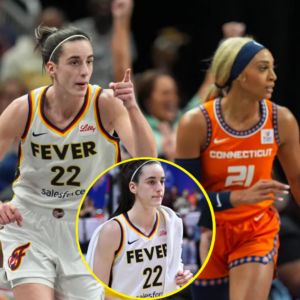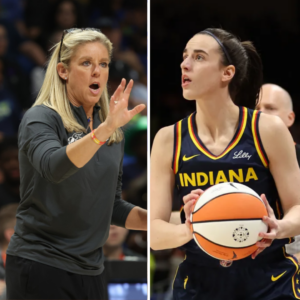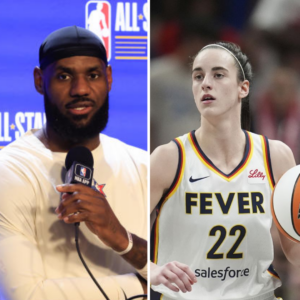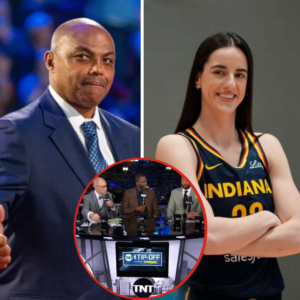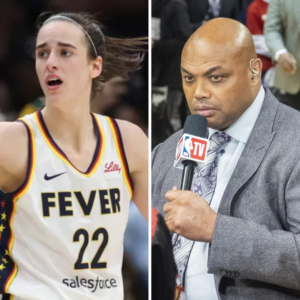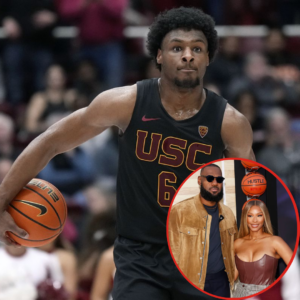The buzz surrounding Caitlin Clark’s selection as the top pick by the Indiana Fever in the 2024 WNBA Draft attracted 2.45 million viewers, surpassing the league’s prior draft record by 307%. This further underscores the influence that the NCAA’s highest scorer in men’s and women’s basketball history will wield in the WNBA.
Clark’s selection also put her future WNBA salary in the spotlight, leading to criticisms of her pay not just spreading across social media, but from the White House as well, with President Joe Biden saying on social media that “Women in sports continue to push new boundaries and inspire us all. But right now we’re seeing that even if you’re the best, women are not paid their fair share.”
Clark will earn $338,056 over four years, according to the WNBA’s collective bargaining agreement. Comparatively, San Antonio Spurs rookie Victor Wembanyama — the No. 1 pick in last year’s NBA draft — signed a $55 million four-year contract.
However, WNBA Commissioner Cathy Engelbert, speaking at CNBC’s inaugural Changemakers Summit on Thursday in New York City, said there’s a “false narrative” around Clark’s expected salary, likening it to the way that executive salaries are displayed for public companies.
“It’s proxy season; for a CEO, do you just put the base pay in there?
No, you put their bonus, you put their stock options, you put everything,” said Engelbert, who was named the WNBA’s first commissioner in 2019 after serving as CEO of Deloitte, and was named to CNBC’s first Changemakers list earlier this year.
Cathy Engelbert, Commissioner of the Women’s National Basketball Association (WNBA) speaking at the CNBC Changemakers Summit in New York on April 18th, 2024.
“Caitlin has the ability to make up to a half of a million dollars just in WNBA wages this year, so they’re just looking at a base, which is collectively bargained and actually is low, because she’s the number one pick,” Engelbert said.
“But she also has millions and millions of dollars in endorsements, and actually because she’s declared to become pro, her endorsements are higher in dollar value – she has a global platform now, not just a U.S. platform, so she’s going to do just fine as well.”
During her tenure at Iowa, Clark secured multiple sponsorship agreements with major brands such as Nike, Gatorade, and State Farm, thanks to the NCAA’s name, image, and likeness regulations. While many of these partnerships will extend into her WNBA career, her growing influence is also attracting new opportunities. Reportedly, Clark is on the verge of inking a lucrative contract with Nike, exceeding $20 million and incorporating a personalized sneaker line, as per The Athletic.
WNBA Commissioner Cathy Engelbert shared her thoughts on the discourse surrounding Caitlin Clark’s pay, speaking at the 2024 CNBC Changemakers event in New York City.
Learn more about the 2024
#CNBCChangemakers: https://t.co/prNJJtNDWO pic.twitter.com/zGZNyWmU5O— CNBC (@CNBC) April 18, 2024
In addressing concerns about the variance in salary between WNBA draftees and their counterparts in established men’s leagues, Engelbert emphasized the WNBA’s relative youth, now entering its 28th season, compared to leagues with histories spanning several decades or even a century. She highlighted the significant revenue gap between the NBA, boasting around $13 billion, and the WNBA, which currently stands at approximately $200 million.
“I would say if you look at them 28 seasons in, we’re further ahead, but we realize we still have a lot of work to do, and it’s all about the ecosystem around us that drives revenue,” Engelbert said.
NEW YORK, NEW YORK – APRIL 15: Caitlin Clark poses with WNBA Commissioner Cathy Engelbert after being selected first overall pick by the Indiana Fever during the 2024 WNBA Draft at Brooklyn Academy of Music on April 15, 2024 in New York City.

Caitlin Clark poses with WNBA Commissioner Cathy Engelbert after being selected first overall pick by the Indiana Fever during the 2024 WNBA Draft.
The WNBA has two main revenue drivers in media rights and sponsorships, and teams have the main revenue driver of ticketing, Engelbert said.
Currently, the league is working on its next media rights deal alongside the NBA, whose exclusive TV rights negotiating window with ESPN and Warner Bros.
Discovery is expected to expire Monday without a new deal, opening up the door for other media and tech companies like Amazon, Apple and Netflix to potentially get involved in the bidding.
The WNBA’s existing media rights deal is worth roughly $60 million a year and expires in 2025, and Engelbert said she expects that to double.
“We hope to at least double our rights fees,” Engelbert said on CNBC’s “Squawk Box” in April.
“Women’s sports rights fees have been undervalued for too long, so we have this enormous opportunity at a time where the media landscape is changing so much.”
Engelbert likened the WNBA to a “growth stock,” adding that the league, and women’s sports in general, is shedding the false view of it being “a charity or the right thing to do to support women.”
“We are a legitimate sports, media and entertainment property,” Engelbert said.
News
Opposition Fans Erupted In Chants Of “We Want Caitlin” After She Was Benched With 15 Minutes Remaining In The Heavy Defeat
On Monday, the Mohegan Sun Arena in Uncasville, Connecticut, was packed with fans as Caitlin Clark was in action. Fans arrived in large numbers for Indiana Fever’s game against the Connecticut Sun on June 10. The fans, who arrived with…
Surprisingly, The Reason Why Caitlin Clark and Indiana Fever Lost To Seattle Storm Was Because Of The Actions Of Coach Christie Sides
Caitlin Clark and the Indiana Fever suffered defeat in their recent WNBA matchup against the Seattle Storm due to a pivotal decision made by head coach Christie Sides, which left the team exposed. Sides is shouldering the entirety of…
LeBron James Gives The Reason Why Caitlin Clark is The One Who Makes WNBA “History” – Urges Everyone Not to “Criticize” Her At a “Moment” But Look at “The Whole Process”
No athlete in the annals of sports history has encountered as much pressure upon entering the professional arena as LeBron James did in the NBA. From the outset, James bore the responsibility of guiding a franchise to success. Caitlin Clark,…
On Recent Online Television, Charles Barkley Spoke Up To “Protect” Caitlin Clark From Attacks From “Women” – “You Women Out There, Ya’ll Petty,..”
Charles Barkley, a renowned member of the Basketball Hall of Fame, publicly criticized WNBA players who express disdain towards Caitlin Clark, the Indiana Fever guard chosen as the top pick in the 2024 WNBA Draft. Caitlin Clark made her mark…
Watch Now: Charles Barkley “Rips Women Apart” For Hating Indiana Fever Superstar Caitlin Clark While Talking Passionately On Live TV
Charles Barkley, a renowned member of the Basketball Hall of Fame, publicly criticized WNBA players who express disdain towards Caitlin Clark, the Indiana Fever guard chosen as the top pick in the 2024 WNBA Draft. Caitlin Clark made her mark…
“Excited, Emotional, Anxious, Jittery, Proud, etc etc etc!!!” – LeBron James “Emotionally” Shares His And His Wife Savannah’s Thoughts After Son Bronny James’s Pro Day Visit
Bronny James, the son of LeBron James, officially announced his intention to enter the 2024 NBA draft. The 19-year-old recently arrived in Los Angeles to participate in his Pro Day with the Lakers. During Bronny James’ Pro Day session at…
End of content
No more pages to load

